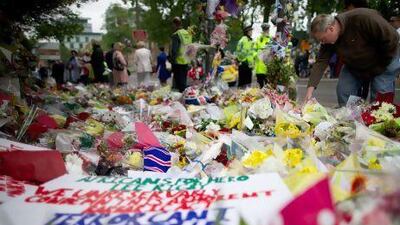LONDON // British prime minister David Cameron may have cautioned against knee-jerk reactions after the killing of British soldier Lee Rigby on a London street, but that did not stop them, including from Mr Cameron's own government.
Ministers vowed to expand the powers of the security services, anti-Islamic incidents spiked and a seemingly moribund far-right group became suddenly visible again.
So dramatic was the reaction to the murder last week that it was easy to forget that this was the first instance of an apparent Islamist-inspired fatal attack in the UK since the 2005 bombings that killed 56 people, including four suicide bombers.
And it was a sustained reaction. In the week since Rigby was killed, there have been 200 anti-Muslim incidents, approximately one-third of the usual yearly average according to a count by Tell Mama, a website that tracks anti-Muslim hate crimes.
The bulk of those, however, came in the first days after the murder when emotions ran high. There are signs that the dust is settling.
On Monday, some 1,000 supporters of the far-right English Defence League, EDL, which was formed around an anti-Islamist agenda in 2009, marched in London, chanting "Muslim killers off our streets".
It was the best-attended demonstration the group has mustered in two years.
But on the same day a collection for army veterans set up by EDL leader Tommy Robinson was unceremoniously rejected by Help for Heroes, the charity that stood to gain.
Meanwhile, plans by Theresa May, the home secretary, to seek new powers to tackle the "poisonous rhetoric" of radical clerics, and restore the controversial Communications Data Bill, which would give security services unprecedented access to people's internet communications, are also are also beginning to meet resistance.
Civil rights groups have objected and even members of the governing coalition are uneasy about reviving a communications bill that has been dubbed a 'snooper's charter' by critics.
Shami Chakrabarti, director of the UK civil rights group, Liberty, urged Ms May to shun those who "shamelessly play politics with murder and fear".
"The terrorists can't shut down our open society. Why would we do it for them?"
The question is what will happen now some time has passed since the killing. It is "sad", but a fact, that anti-Muslim incidents spike after Rigby's murder, said Jamie Bartlett, head of the Violence and Extremism Programme at Demos, a London-based think tank.
"The real worry for people is that that becomes a spiralling symbiotic relationship of retaliation and counter-retaliation".
The EDL's change in fortunes since the killing may not be sustainable. It has a long way to go to reach the height of its popularity, in 2011, when a Demos report by Mr Bartlett found the movement had between 25,000 to 35,000 members.
But widespread revulsion at the Woolwich murder has given it fresh impetus.
"The EDL was in the middle of an implosion," said Mr Bartlett. "That seems to have changed now."
To some, like Tell Mama director Fiyaz Mughal, the reaction to the Woolwich killing suggests that there is a "great amount of latent Islamophobia" in Britain.
The spike in anti-Muslim attacks since last Wednesday may be settling down, said Mr Mughal. But every time there is an incident of apparently Islamist-inspired violence, he added, the baseline number of attacks – over the past year before Woolwich, of four to six a day – rises.
The issue of Islamophobia is becoming "pervasive" and "the intensity of the attacks was surprising", he said. "But what was not surprising was the amount of latent Islamophobia. We know there is a pool in society that is quite vitriolically Islamophobic."
Mr Mughal, who has been subjected to death threats in the past week and whose staff have suffered abuse from angry callers, said tackling Islamophobia had to be done at the same time as tackling radical Islamist preachers. It was only right to "scrutinise" additional police powers, he said. But it cannot be one-sided.
"The home office wants to focus down on radical preachers. It's something I happen to support. But why is it that when we have tried to push action on some of the most pernicious and determined far right haters online, no action has been taken?"
Mr Bartlett said he supported the Data Communications Bill. But he suggested that it should not be approved while emotions run high. He also said ministers needed to think hard about taking additional measures to clamp down on radical rhetoric.
There have been for some time now, he said, environments where radical Islamism is a "cool and exciting counter-cultural" phenomenon. Cracking down on radical preachers could just create "free speech martyrs".
twitter: For breaking news from the Gulf, the Middle East and around the globe follow The National World. Follow us

